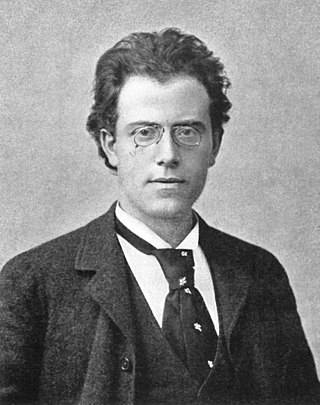
Lieder eines fahrenden Gesellen is a song cycle by Gustav Mahler on his own texts. The cycle of four lieder for medium voice was written around 1884–85 in the wake of Mahler's unhappy love for soprano Johanna Richter, whom he met as the conductor of the opera house in Kassel, Germany, and orchestrated and revised in the 1890s.

Böhse Onkelz, sensational spelling of böse Onkels is a German rock band formed in Frankfurt in 1980. The band reunited in 2014. Despite mass-media criticism concerning their past as skinheads, several of their later records topped the German album charts. E.I.N.S. was their most successful album, with over 510,000 copies sold.
Paul Godwin (1902–1982) was a violinist and the leader of a popular German dance orchestra in the 1920s and 30s.
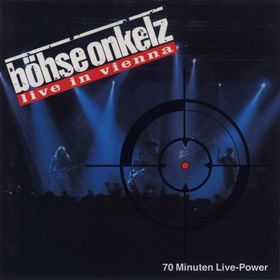
Live in Vienna is the first live album by German rock band Böhse Onkelz. It was recorded on 13 December 1991 at the Vienna Messepalast.

Gestern war heute noch morgen is a song compilation of the German rock band Böhse Onkelz. It was released on three CDs. The box reached the third position in the German Media Control Charts which is really rare for best-ofs.

Michael Holm is a German singer, musician, songwriter and record producer. He is primarily known as a singer of Schlager music. Although his first appearance in the hit parade was in 1962, he had his first big hit in 1969. "Mendocino", the German adaptation of a song by the Sir Douglas Quintet, was the biggest selling single that year in (Germany). The record was released in September 1969, reached number three for five weeks, selling over a million copies. Ariola presented him with a gold record in October 1970.
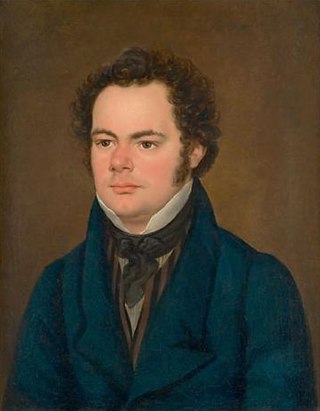
"Der Wanderer" [formerly D 493] is a lied composed by Franz Schubert in October 1816 for voice and piano. A revised version was published near the end of May 1821 as opus 4, number 1. The words are taken from a German poem by Georg Philipp Schmidt. The lied is set in the key of C-sharp minor with the tempo marking sehr langsam and the time signature alla breve. The piece has a total of 72 measures. Schubert wrote another lied entitled "Der Wanderer;" it is numbered D.649.

Ireen Sheer is a German-English singer. She had a top five hit on the German singles chart with "Goodbye Mama" in 1973. She went on to finish fourth at the Eurovision Song Contest 1974 representing Luxembourg, sixth at the Eurovision Song Contest 1978 representing Germany, and thirteenth at the Eurovision Song Contest 1985 representing Luxembourg again.

Lena Valaitis is a Lithuanian–German schlager singer who had her greatest success during the 1970s and 1980s. She finished second at the 1981 Eurovision Song Contest.

Katja Ebstein is a German singer. She was born in Girlachsdorf. She achieved success with songs such as "Theater" and "Es war einmal ein Jäger". She was married to Christian Bruhn, who wrote many of her songs.
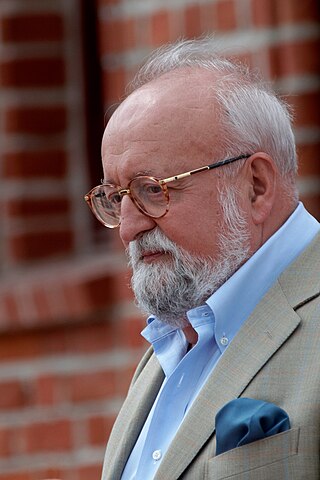
The Symphony No. 8 "Lieder der Vergänglichkeit" by Krzysztof Penderecki is a choral symphony in twelve relatively short movements set to 19th and early 20th-century German poems. The work was completed and premiered in 2005. The symphony has an approximate duration of 35 minutes. Penderecki revised the symphony in 2007 by adding a few more poem settings and the piece has expanded to around 50 minutes. Although given the designation Symphony No. 8, it was not actually the final symphony Penderecki completed before his death in March 2020; the Sixth Symphony, begun in 2008, was not completed until 2017.

“Guten Tag” is a 2002 song by German band Wir sind Helden. It was first released on an EP of the same title in 2002 and one year later as the first single of their debut album Die Reklamation. It was composed by Jean-Michel Tourette, Judith Holofernes and Pola Roy while the lyrics were written by Holofernes. The title is German for good day.

Simone Stelzer is an Austrian pop singer.
The 66 Chorale improvisations for organ, Op. 65, were composed by Sigfrid Karg-Elert between 1906 and 1908, and first published in six volumes in 1909. The composition was dedicated to "the great organist Alexandre Guilmant".
"I Lost My Heart in Heidelberg" is a German song composed in 1925 by Fred Raymond with lyrics by Fritz Löhner-Beda and Ernst Neubach. The song was an immediate popular hit, and in 1927 Raymond included it in a musical of the same name. Two films, released in 1926 and in 1952, take their titles from the song. It remains the theme song of Heidelberg. It was recorded in Britain by the duo Bob and Alf Pearson.

"Nun freut euch, lieben Christen g'mein", or “Dear Christians, One and All, Rejoice” in English, is a Lutheran hymn, written in 1523 by Martin Luther. It is one of Luther's early hymns and considered by some as one of his finest. It was published as one of eight songs in 1524 in the first Lutheran hymnal, the Achtliederbuch. The Achtliederbuch contained four songs by Luther, three by Speratus, and one by Justus Jonas. It appeared also in 1524 in the Erfurt Enchiridion.
"Herzlich tut mich verlangen" is a German hymn, with lyrics written in 1599 by Christoph Knoll, with a melody adapted from a secular song by Hans Leo Hassler. It is a prayer for a blessed death, beginning "Herzlich tut mich verlangen nach einem sel'gen End". Its hymn tune, Zahn No. 5385a, was later also used for Paul Gerhardt's "Befiehl du deine Wege" and "O Haupt voll Blut und Wunden".

"Ännchen von Tharau" is a 17-stanza poem by the East Prussian poet Simon Dach. The namesake of the poem is Anna Neander (1615–1689), the daughter of a parson from Tharau, East Prussia. The poem was written on the occasion of her marriage in 1636 and had been set to music as a song by 1642.
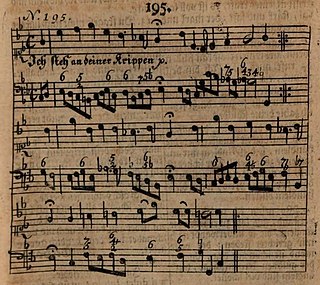
"Ich steh an deiner Krippen hier" is a German Christmas hymn, with lyrics by Paul Gerhardt which were first published in 1653. It was then sung with an older melody by Martin Luther, but a melody which was likely created by Johann Sebastian Bach for Schemellis Gesangbuch of 1736 is now part of current Protestant and Catholic hymnals.















